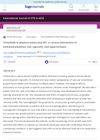 April 2024 in “Journal of translational medicine”
April 2024 in “Journal of translational medicine” MJ04, a new compound, effectively promotes hair growth and is a potential topical treatment for hair loss.
 July 2021 in “IntechOpen eBooks”
July 2021 in “IntechOpen eBooks” Ginseng, especially its component ginsenosides, can promote hair growth, reduce hair loss, and potentially treat conditions like alopecia by affecting cell pathways and cytokines.
1 citations,
December 2019 in “Clinical ophthalmology” Bimatoprost eye drops make rabbit eyelashes longer, thicker, and darker, and increase the number of lashes without causing inflammation.
 4 citations,
April 2019 in “Cell Stem Cell”
4 citations,
April 2019 in “Cell Stem Cell” Certain immune cells in the skin can stop hair from growing.
 July 2012 in “Faculty Opinions – Post-Publication Peer Review of the Biomedical Literature”
July 2012 in “Faculty Opinions – Post-Publication Peer Review of the Biomedical Literature” New treatment with Wnt proteins and growth factors safely increases hair thickness.
 2 citations,
March 2022 in “Journal of Personalized Medicine”
2 citations,
March 2022 in “Journal of Personalized Medicine” Personalized medicine is important for treating skin disorders, with new treatments and connections to hormones and genetics being explored.
 April 2023 in “Revista colombiana de reumatología”
April 2023 in “Revista colombiana de reumatología” JAK inhibitors like tofacitinib can effectively treat severe alopecia areata.
 3 citations,
March 2021 in “Clinical, Cosmetic and Investigational Dermatology”
3 citations,
March 2021 in “Clinical, Cosmetic and Investigational Dermatology” Early treatment of Lupus Erythematosus Alopecia can prevent permanent hair loss, and various medications are effective.
 2 citations,
April 2019 in “Dermatologic Therapy”
2 citations,
April 2019 in “Dermatologic Therapy” A patient with alopecia had hair regrowth with tofacitinib but developed a skin reaction, choosing to continue the treatment despite the side effect.
 39 citations,
April 2016 in “Case Reports in Dermatology”
39 citations,
April 2016 in “Case Reports in Dermatology” Tofacitinib temporarily regrew hair in a man with alopecia, but its effects didn't last.
15 citations,
December 2018 in “International journal of environmental research and public health/International journal of environmental research and public health” EGCG may help treat alopecia areata by blocking certain immune responses and reducing specific harmful immune cells.
 24 citations,
June 2016 in “Acta dermato-venereologica”
24 citations,
June 2016 in “Acta dermato-venereologica” Tofacitinib helped a young woman's severe hair loss and arthritis but not her plaque psoriasis.
 November 2023 in “Indian Dermatology Online Journal”
November 2023 in “Indian Dermatology Online Journal” Tofacitinib was effective for severe, treatment-resistant hair loss without side effects.
 December 2024 in “Cureus”
December 2024 in “Cureus” Tirzepatide improved symptoms and hair regrowth in a man with folliculitis decalvans.
January 2020 in “Indian Journal of Pharmaceutical Sciences” Natural products show promise for new hair loss treatments.
 38 citations,
January 2019 in “International Journal of Women's Dermatology”
38 citations,
January 2019 in “International Journal of Women's Dermatology” The document concluded that more research is needed to find the best treatment for Frontal fibrosing alopecia.
 February 2025 in “International Journal of STD & AIDS”
February 2025 in “International Journal of STD & AIDS” Tofacitinib can cause unusual hair growth, requiring careful monitoring and possible laser hair removal.
13 citations,
September 2022 in “Frontiers in immunology” Ifidancitinib, a JAK inhibitor, effectively regrows hair in mice with alopecia by tiring out harmful T cells.
 April 2024 in “JEADV clinical practice”
April 2024 in “JEADV clinical practice” Upadacitinib significantly improved both rheumatoid arthritis and alopecia areata in a patient.
 5 citations,
July 2020 in “Curēus”
5 citations,
July 2020 in “Curēus” Beard hair loss can signal early diabetes and thyroid issues, treatable with specific cream.
 January 2025 in “Balkan Medical Journal”
January 2025 in “Balkan Medical Journal” Baricitinib helps regrow hair in severe alopecia areata and is safe, but more research is needed.
 38 citations,
March 2017 in “Expert Opinion on Investigational Drugs”
38 citations,
March 2017 in “Expert Opinion on Investigational Drugs” Bimatoprost is promising for treating some types of hair loss but needs more testing for androgenetic alopecia.
 1 citations,
August 2022 in “JAAD Case Reports”
1 citations,
August 2022 in “JAAD Case Reports” A woman's complete hair loss condition improved after recovering from COVID-19.
 May 2019 in “Australasian Journal of Dermatology”
May 2019 in “Australasian Journal of Dermatology” The document discusses hair and nail conditions, updates on treatments for alopecia, and controversies around finasteride use.
January 2019 in “Springer eBooks” Combination therapies might work better for some vitiligo patients, but results vary.
20 citations,
November 2017 in “JAAD case reports” Ustekinumab significantly improved psoriasis, vitiligo, and alopecia areata in a patient.
 6 citations,
May 2023 in “Drugs”
6 citations,
May 2023 in “Drugs” Baricitinib helps regrow hair in adults with severe alopecia better than a placebo and is approved for treatment, but long-term effects are still unknown.
 September 2023 in “JAAD case reports”
September 2023 in “JAAD case reports” A man developed oral hairy leukoplakia while on baricitinib, a medication for alopecia and arthritis, and doctors should watch for such side effects.
 14 citations,
January 2017 in “Skin appendage disorders”
14 citations,
January 2017 in “Skin appendage disorders” Simvastatin/ezetimibe did not effectively treat severe alopecia areata and caused side effects in some patients.
July 2021 in “Journal of dermatology & dermatologic surgery” IMTA can help regrow hair in severe alopecia areata when JAK inhibitors don't work well.























